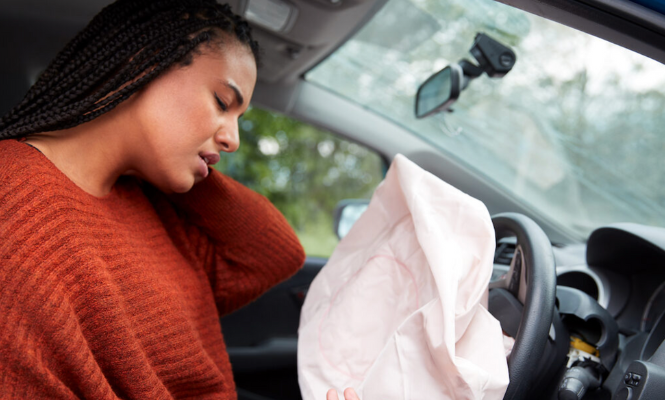Airbags might be one of your car’s safety features that you do not often think about—until you need them. Airbags were first introduced in the 1970s and became required in all new passenger vehicles in the late 1990s. The National Highway Traffic Safety Administration (NHTSA) estimates that frontal airbags saved 50,457 lives as of 2017. While airbags can be important to your safety in the event of a car crash, they can pose risks, especially when used improperly. Use these valuable airbag safety facts to maximize airbag efficacy and reduce your risk.
NHTSA estimates that frontal airbags have saved 50,457 lives as of 2017.
Get the Most Out of Your Airbags
1. How do airbags work?
Airbags act as a cushion to help reduce the risk of injury when you get into a serious auto accident. Front airbags are required in new vehicles, and some will also have side or curtain airbags. Airbags inflate when sensors connected to the airbags detect a front-end collision (if your vehicle also has side airbags, they will inflate in the event of a side collision). Airbags inflate with nitrogen gas in milliseconds and deflate soon after the driver or passengers contact them.
2. What do I do when my airbag deploys?
Call 911 emergency services when your airbag deploys during a collision. Even if the accident was not severe, a police report might be necessary for insurance coverage. Check for injuries and seek medical treatment when necessary. Turn your car’s engine off post-collision. Avoid driving your vehicle after the airbags deploy. Call a tow truck to transport you, your occupants, and your vehicle to a safe location.
3. Are there safety risks to being hit by an airbag?
Airbag safety risks do exist. More than 290 deaths were caused by frontal airbag inflation in low-speed crashes between 1990 and 2008. However, nearly 90% of these deaths occurred in vehicles manufactured before 1998 (the year federal rules encouraged vehicle manufacturers to reduce energy in front airbags to make them safer). In more than 80% of fatalities, the occupants were unbelted or improperly restrained. Airbags can also cause head, neck, and other injuries to drivers and passengers. However, injuries from properly functioning airbags are rare. Front airbags were found to reduce driver fatalities in frontal crashes by 29% and fatalities of front-seat passengers 13 and older by 32%, while side airbags that protect the head were found to reduce the risk of death in driver-side crashes by 37% for a car driver and 52% for an SUV driver.
4. How do I stay as safe as possible when it comes to airbags?
Many injuries involving airbags occur when the driver or front-seat passenger is too close to the wheel or dashboard. Drivers should maintain a distance of at least 10 inches between their chest and the steering wheel. Front-seat passengers should also keep at least 10 inches between themselves and the dashboard. All occupants should avoid resting legs, arms, and other body parts against an airbag. Wearing a seat belt is also incredibly important to your safety. An NHTSA study found that the combination of seat belts and airbags is 75% effective in preventing serious head injuries and 66% effective in preventing serious chest injuries. Additionally, children under 13 years of age or under height and weight requirements for airbag use should not sit in the front seat.
5. Do airbags ever deploy on accident?
Airbags can deploy on accident, although it is rare. Accidental airbag deployment is typically caused by improper installation or tampering with the airbag system, faulty airbags, and manufacturer defects. A collision with a pothole or curb can trigger the airbag sensors, too.
6. Can I reuse a deployed airbag?
No, you cannot reuse an airbag after it has been deployed.
7. How do I replace my airbags?
Visiting a licensed auto body repair professional to replace your airbags is the safest thing to do after your airbags inflate.
Get Help on Your Road to Recovery
When you are in a car accident or injured when your airbag deploys, you may not know your next steps. Even low-impact collisions can cause injuries that cost more and require more treatment than most people realize. Your case needs personalized attention to give you your best chance of getting a fair settlement. Car accident attorney David Ranz has extensive experience representing car accident victims. David and his friendly, dedicated team understand how stressful the aftermath of a car accident can be and are here to handle your case, so you can focus on your recovery.
If you or a loved one was involved in a traffic accident in Federal Way, Washington, or anywhere in Washington state, call or text car accident attorney David Ranz at Ranz Injury Law at (206) 429-5227 to get a free, no-obligation case evaluation. If you retain us to represent you, there are no attorney’s fees if there is no settlement.
Airbag Safety Citations
- National Highway Traffic Safety Administration (NHTSA) – 2018 Data: Occupant Protection in Passenger Vehicles
- Insurance Institute for Highway Safety (IIHS) – Airbags
- American Family Insurance – All About Airbags
- Northwest Auto Center – 5 Things to Know About Airbags
- Connecticut Department of Transportation – Air Bag Basics
- Seat Belt Restore – What You Need to Know about Accidental Airbag Deployment


